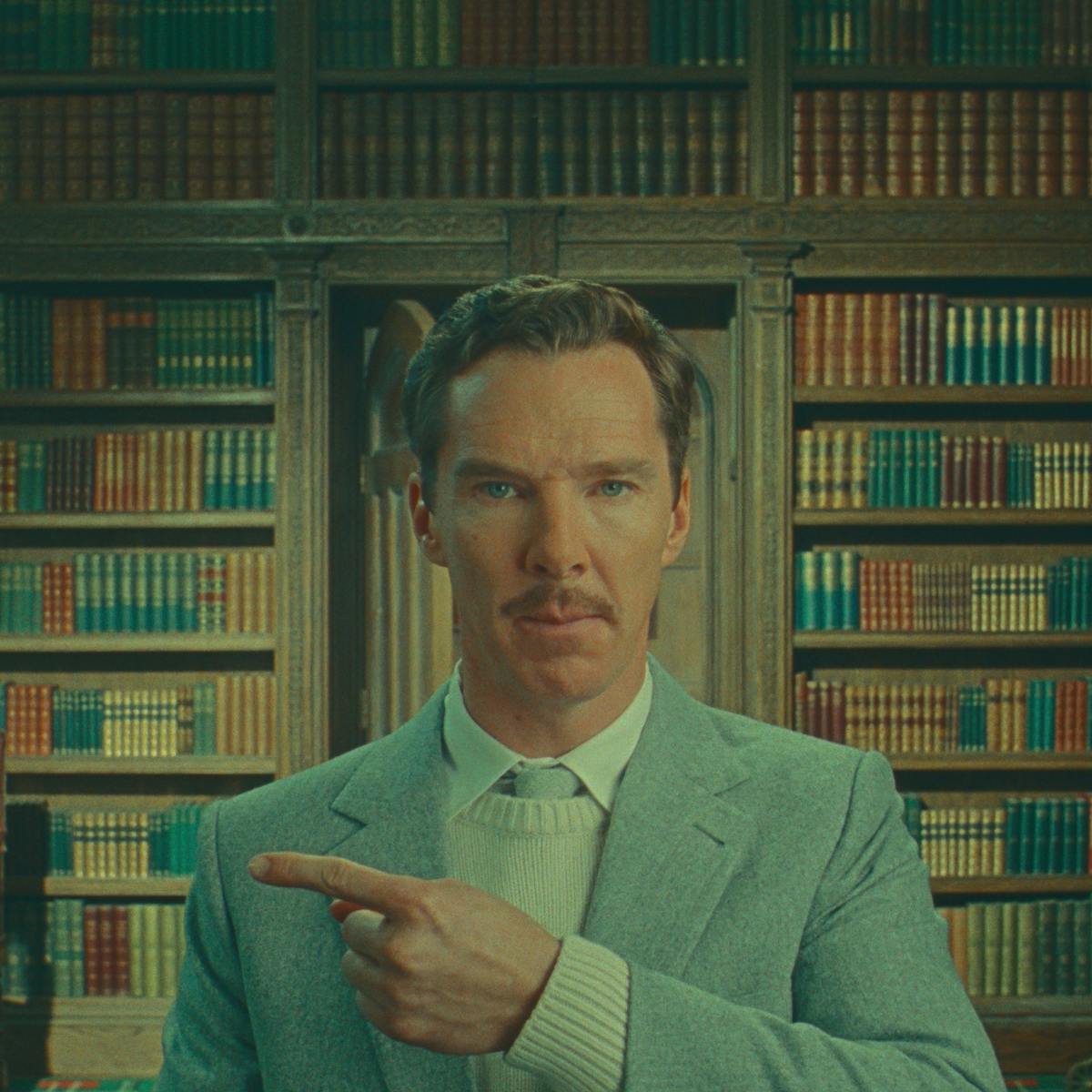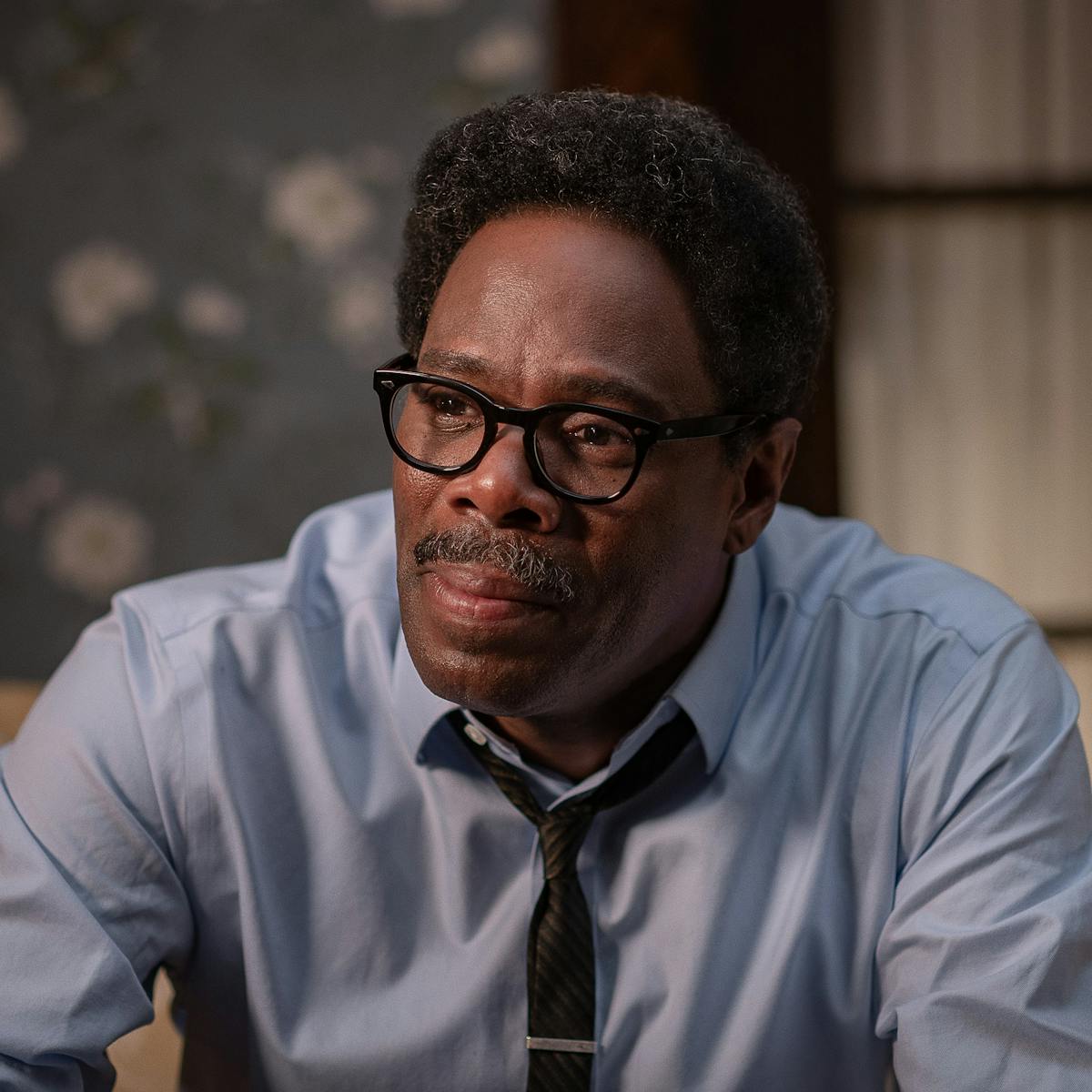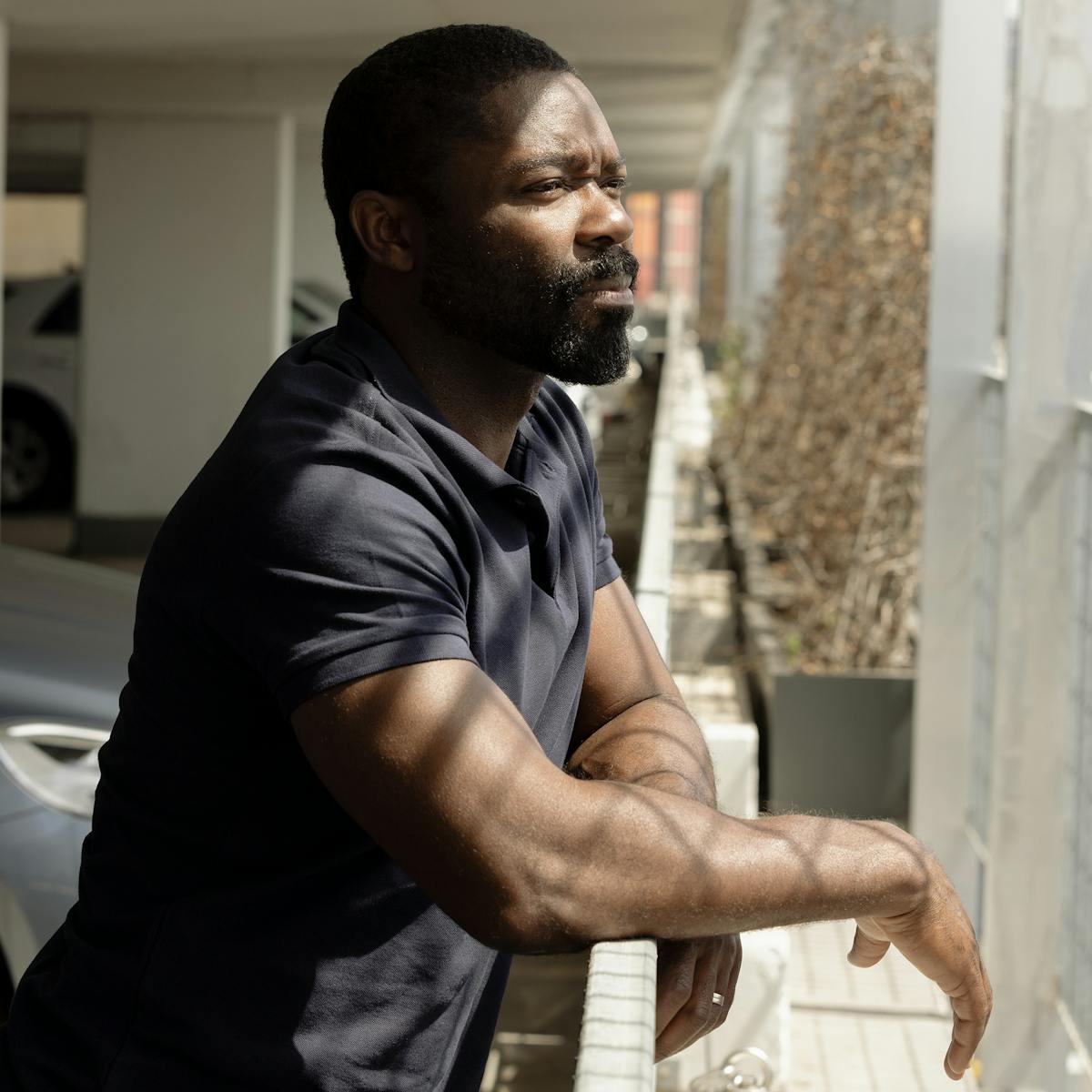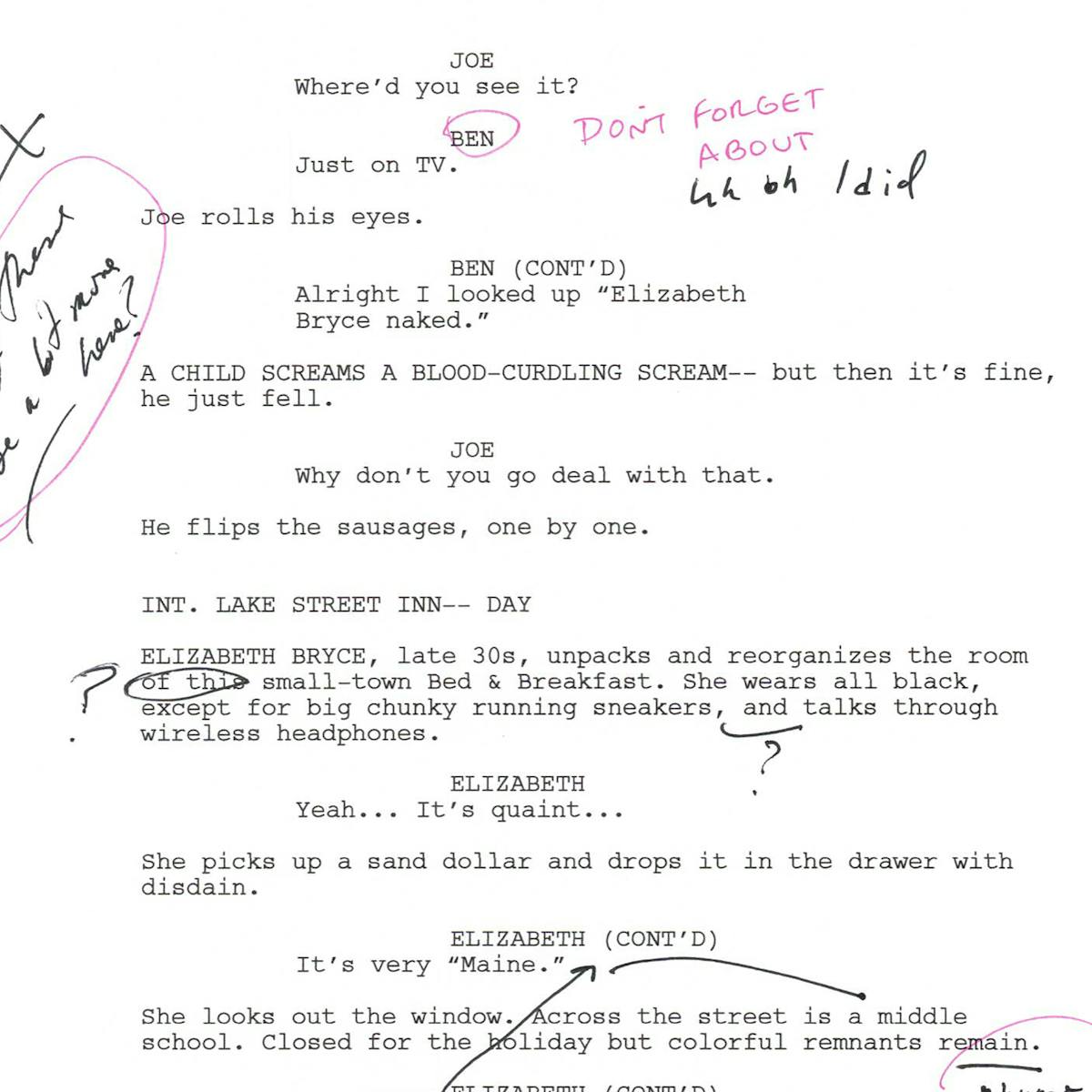Dev Patel and Benedict Cumberbatch bring whimsical charisma to Wes Anderson's Roald Dahl adaptation.
In his whimsical fable The Wonderful Story of Henry Sugar, author Roald Dahl relates the redemptive experiences of an arrogant gambler whose life is forever altered by a slim volume he discovers in his friend’s library. For a young Wes Anderson, that story proved especially impactful. He picked up the tale during an elementary school book fair, and it turned out to be his gateway into Dahl’s vast and wondrous worlds. Inspired, he followed in the footsteps of the story’s wayward protagonist, spending many a night attempting to learn to see without his eyes — unlike Henry Sugar, he never succeeded. “That’s Dahl, I feel like,” Anderson says. “He finds the thing that really speaks to people and that they don’t forget.”
Recently nominated for the Best Live Action Short Film Oscar, Anderson’s almost 40-minute Dahl adaptation has all the hallmarks of the auteur’s best-loved work, movies like The Royal Tenenbaums, The Grand Budapest Hotel, and his earlier Dahl adaptation, the stop-motion animated feature Fantastic Mr. Fox. It boasts beautifully appointed sets from Anderson’s longtime collaborator, production designer Adam Stockhausen, framed with singular care. And, of course, there’s the rapid-fire cerebral language that’s become his signature, delivered with just the right engaging flourish by a cadre of the most gifted actors working today. In this case, the cast includes Benedict Cumberbatch in the title role, Dev Patel as the author of the all-important book Henry discovers, Ben Kingsley as mysterious Imdad Khan, Richard Ayoade as the Great Yogi, and Ralph Fiennes as Dahl himself.
Notably, Henry Sugar joins the ranks of Anderson’s impressive short film catalog — which includes Castello Cavalcanti (2013), Hotel Chevalier (2007), and Bottle Rocket (1993), a proof-of-concept short version of his 1996 directorial debut.
Despite the compact running time — “It’s quite a lot shorter than Dahl[’s story],” Anderson concedes — none of the inherent magic in Dahl’s tale was lost in translation. The filmmaker recently joined Cumberbatch and Patel for a conversation moderated by IndieWire’s chief film critic David Ehrlich in which they reflected on bringing the uniquely charming tale to the screen.
An edited version of the conversation follows.

Henry Sugar (Benedict Cumberbatch)
David Ehrlich: Wes, you’ve been drawn to this particular story for a very long time. The Dahl family had set aside the rights for you ever since you made Fantastic Mr. Fox. What was the aha moment that allowed you to figure out how to preserve the essence of what you love so much about this when bringing it to the screen?
Wes Anderson: Yes. I had spoken with Liccy Dahl, who’s Dahl’s widow, when we were working on Fantastic Mr. Fox. We wrote quite a bit [with] Noah Baumbach, and we were staying at Gipsy House, Roald Dahl’s house in Great Missenden in England. Dahl’s grandson, Luke Kelly, was there with us part of the time — he was a 16-year-old, I think — and he later took over running the movie part of the Dahl estate from Liccy. So, first, Liccy held it for me, and then Luke held it for me for many years after that, Henry Sugar. The moment that you’re describing was Luke telling me, “Look, eventually you’ve got to either do it, or I probably should let one of the other people who wants to do it do it.” That was during the early COVID lockdown times. So, I just took the story, I took the entire text and I put it into my computer and started on a MS Word document and started pulling what I thought I wanted. I realized that what I wanted was for Dahl to tell the story.
Dev and Benedict, this, surprisingly, is the first Wes Anderson film for either of you. Was there an initiation ceremony? What does it mean for an actor, particularly actors of your caliber and renown to be invited to play in Wes’s world?
Benedict Cumberbatch: I’m a huge admirer of Wes’s craft, his intelligence and his taste. And what a great first venture. It feels quintessentially English in a way. So, I guess that opens the door a crack for me. I step in as someone who’s known as speaking a lot very fast as Sherlock Holmes [in Sherlock]. I have to say that it did equate with deduction days kind of on steroids. Every single day was walking through five different brilliant Adam Stockhausen sets, flicking from an entrance to a piece of observation, then going into character again, then back into being an authorial voice all the while juggling props and costume. It was an absolute joy from beginning to end.
Dev Patel: I think the [the fact] that I somehow registered on Wes’s radar filled me with euphoria, which quickly changed to terror. It’s like grabbing on for dear life, then you’re on a set with Benedict, all of them. And when everyone talks about saying their lines fast, I think that the adrenaline . . . my heart was going to beat out of my chest. Wes, you said that was probably about the first time in your career you told someone to slow down.
Anderson: Yeah, you were going too fast.
Patel: Once you find the rhythm of the dialogue, there is a music to it. I did find myself settling into my skin the more shoot days we had. But it was like a beautiful, finely tuned watch with all these precise movements inside and you just had to know where your part fits. I remember getting home after each day, and I’d never been so physically exhausted. I had just finished doing a huge action film that I’d written and directed in the middle of COVID, and I thought, Okay, nothing can ever top that energy output. Then you get on this and not only is it a precise kind of exercise, but it’s also incredibly physical.

Dr. Chatterjee (Dev Patel), Imdad Khan (Sir Ben Kingsley), and Dr. Marshall (Richard Ayoade)
Cumberbatch: It’s meat and drink to have these challenges as an actor, and sometimes you’re left going, Did I really throw that all out there? The endeavor of it was so satisfyingly exhausting. And Wes, you’re also terribly generous. It hit the skids on more than one occasion with me going, “I can’t do this.” He was so good at exorcizing the fear and just carrying on. You felt that you could breathe again, and it was alright to fail.
Anderson: For me, being on the set, I can see sometimes I’ve made something difficult because we’re not cutting, for instance. It might be a long take and there’s a lot of things moving around. But . . . your performances are telling us a story so directly in every one of these shots. So, even when I could see it was challenging and we would do a lot of takes — because sometimes there’s also some complicated thing happening with the set or there are a number of people who have to all work together to make it work — still, it was always a pleasure just watching you play. Dev, when you say it’s exhausting, even compared to working in an action movie, I think of this shot where you go down the hospital corridor. It was a lot of takes with a lot of people moving around, and Dev is talking constantly through the whole thing. To walk fast, looking backward, dodging people and telling us a story with a lot of words during that, is a big, physical, challenging thing to do. I can see how it could be draining. And by the way, that’s not the only thing we did that day.
Patel: It’s a testament to Wes though, because he knows you’re going in on the deep end, but at the same time he approaches the scenarios with so much humor. He’s got this very gentle way to slowly push a few more chips forward. He’s like, “Okay, we’ve landed this triple axel. Now, why don’t we add a little bit of this and then a bit more of that?” Slowly, more threads are woven into this already complex tapestry. And it’s not just the actors. I mean that shot Wes is talking about, it’s a real technical feat. There’s so much preparation and planning that has gone in before we even arrive to set. Some of these camera moves, these guys have been practicing for weeks.
Cumberbatch: It does create that sort of collegiate thing. There’s often that divide, which I can’t stand, between what’s termed as technicians and whoever’s in front of the camera. It’s like, come on, the talent was first on here when that flap went up that’s been painted by someone who’s incredibly talented, that’s now going to be lit by somebody who’s talented. You are part of many different moving parts [that] create that one moment that works.

Henry Sugar (Benedict Cumberbatch)
How did being in Roald Dahl’s headspace to such an immersive degree impact the three of you? Was there any sort of creative takeaway from the Dahl of it all that will stick with you as you go on to other projects
Patel: I hadn’t read these specific Dahl stories before I attached myself to this project. So, I very much felt like I was working in the rounds of what Wes had created. I don’t know if that’s blasphemous to say, but that’s truthfully my entry point to it. I was trying to service his vision, his rhythm. We found it in precision, and we found it in a lot of faithfulness on set.
Cumberbatch: Like I said before, there’s a real beauty to Henry Sugar’s transformation. And while there’s an innocence to Dahl’s writing, there’s also an amazing Russian doll element of invention within an invention, a story within a story within a story. Like Dev and I’ve said before, it is a perfect marriage between [Dahl’s tale and] Wes’s style, how much is contained in Wes’s worlds and his films. It’s extraordinary. The sheer volume of creative output and imagination and detail and nuance and humor, it’s so abundant. And I think Dahl has that in spades. As a father, it just ignites your imagination to go anywhere with stories.
Patel: The idea of imagination is so key. I think these pieces, they ask you as a viewer to participate in the imagination. It requires you as a performer and as a viewer to use your imagination and participate and that [inspires this] childlike sense of wonder and imagination.
Cumberbatch: One last thing I wanted to add is that the brilliance of what Henry Sugar does all centers around the skill of being still, and that’s a lot more complicated than it seems. It’s something that everything in our modern world screams at us not to do. We’re constantly fighting it to find that kind of purity in our lives.
Anderson: The interesting thing is all of that is coming from this guy sitting alone in a tiny little hut in total silence. Liccy has told me that you were not to go anywhere near this little shed where [Dahl] was sitting for seven hours at a time. He had total solitude and isolation there when he was working.
It’s so rare and wonderful to see a short film that is exactly the right format for the story. Why was it so important for you to make this as a short rather than as a feature?
Anderson: Really, I just started making the script. I started adapting it, and this is the length that came out. It’s shorter. I mean, they’re not delivering every word of this text, but I feel like they delivered everything that I experienced reading the story. They did a great job of bringing this all to life. There’s something about really good actors. They’re bringing their whole personalities to it. An artist can’t create that. It’s them.




